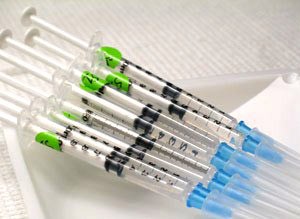Swiss lab director said he’d meet with athletes again in similar circumstances
 Lausanne lab director Martial Saugy has rejected the claim by US Anti Doping Agency CEO Travis Tygart that he essentially gave to Lance Armstrong ‘the keys to defeat the EPO test’ when he met the American and US Postal Service team manager Johan Bruyneel in 2002.
Lausanne lab director Martial Saugy has rejected the claim by US Anti Doping Agency CEO Travis Tygart that he essentially gave to Lance Armstrong ‘the keys to defeat the EPO test’ when he met the American and US Postal Service team manager Johan Bruyneel in 2002.
Saugy called a news conference today to answer Tygart’s accusations this week, which were expressed as part of a 60 Minutes Sport interview.
In that interview, Tygart said that he and the lab director spoke about the issue, which came to the USADA CEO’s attention when Armstrong’s former team-mates disclosed that Armstrong had told them he had tested positive during the 2001 Tour de Suisse, but that the UCI would make sure there would be no problem.
Saugy’s Lausanne lab was the one which tested those samples for EPO.
“Saugy sat down next to me and said, ‘Travis, in fact, there were samples from Lance Armstrong that indicated EPO use,'” Tygart said during the programme.
“And I asked him ‘Did you give Lance Armstrong and Johan Bruyneel [Armstrong’s then manager on the US Postal Service team – ed.] the keys to defeat the EPO test?’ And he nodded his head yes.”
Tygart said that Saugy said he had been instructed by the UCI to meet Armstrong and Bruyneel and to explain the EPO testing process to them. “As far as we are aware it is totally inappropriate to bring an athlete who had a suspicious test and explain to them how the test works,” he said.
Speaking today, Saugy said he was surprised by the claim. “The answer is clear: It’s ‘No,’” he said at the news conference. “I would like to ask him (Tygart), really personally, why did he say that, because personally it was not the case.”
He later elaborated on the point to AP. “I don’t really understand the interpretation on that part of the discussion. For me it is a nonsense.”
Although Tygart, anti-doping scientist Michael Ashenden and others have questioned the notion of giving information to athletes who can then potentially use that information, for example in timing the taking of substances and evading detection, Saugy continues to insist he did nothing wrong. “Travis Tygart is a key person in the fight against doping,” he said. “He knows the rules. He knows we must be transparent in order to respect the right of the defence. We need also to respect all the other athletes.”
Furthermore, he said that he wouldn’t hesitate in a similar situation. “I have absolutely no regret. I would repeat it. They wanted to know what is the basis of the fight against doping. The number one in the peloton is very influential so we need to meet him to explain that we are not doing a bad job.”
He said that other teams and riders got the same information, and he rejected that the information could have been used to evade detection.
Although EPO can be picked up in doping tests, the dosage and timing are crucial for detection. Several pro riders have said that it’s possible to avoid being caught through microdoping the substance late at night.
Armstrong was handed a lifetime ban by USADA in August 2012 after he decided not to contest charges of doping and of helping and coercing others to take banned substances. He also had all of his results since August 1998 stripped from him, including seven Tour titles.